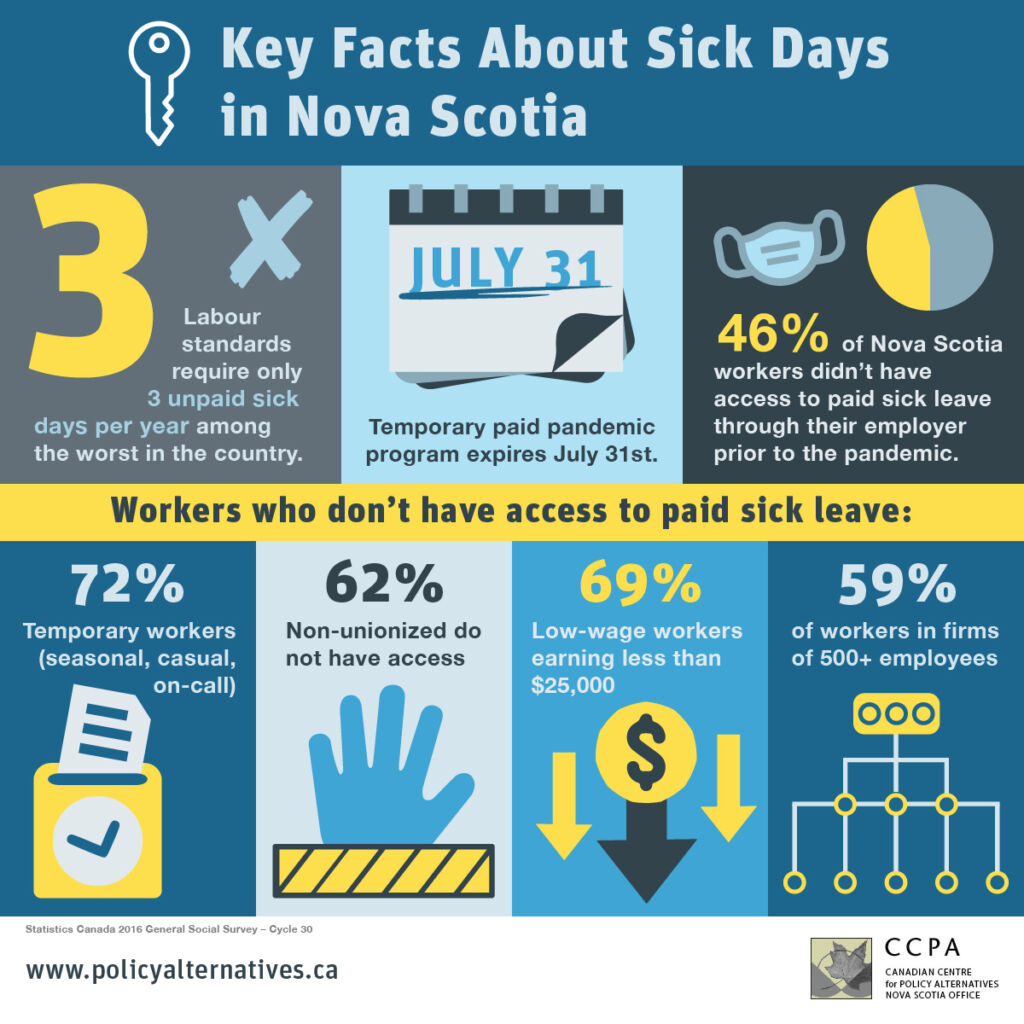On July 31st, the temporary paid sick leave program for Nova Scotia workers expired. Originally implemented by the previous government in response to the third wave of the COVID-19 pandemic, we were told that workers would no longer need this program because of vaccination rates in the province. Now here we are in the fourth wave.
The paid sick leave program was an important recognition that workers should not have to choose between financial well-being and their health. But high vaccination rates don’t change the basic fact that too many Nova Scotian workers are forced to make this choice. Our new report demonstrates the urgency of instituting a permanent paid sick leave program in order to protect workers, their families, and public health broadly.
Drawing on data from Statistics Canada, we show that lack of paid leave hurts Nova Scotian workers who are already precarious: 69% of Nova Scotian workers who earn $25,000 or less do not have access to paid sick leave. Younger workers and those with high school education or less have the least access to paid leave.
Further, we use data from our own survey of retail workers, long-term care workers, and teachers during the first wave of the COVID-19 pandemic to examine prevalence and use of paid sick days before the pandemic.
The expectation to work when sick was highest among retail workers without paid sick leave (71%). Retail workers were the most likely to work when they were sick, even when they had access to paid sick leave (29% compared to 18% of teachers and 16% of long-term care workers). Among retail workers without paid sick leave, 41% reported going to work when sick.
Nearly 90% of retail workers without paid sick leave reported going to work when sick because they needed the money.
We found that even workers who had paid sick leave felt that they were expected to work when sick. Of those we surveyed who had paid sick leave, 65% of teachers, 54% of long-term care workers, and 53% of retail workers reported that they were expected to work when sick.
The new Nova Scotia government must act to institute a better and permanent paid sick leave policy for all workers. As we outline in our report, for a sick leave policy to be effective, it must be universal, paid, adequate, permanent, accessible, and employer-provided.
We recommend that the provincial government update the labour code to require employers to provide 10 paid sick days per year (and 14 days during a public health emergency). This will allow workers sufficient time to access preventative health services, recover from common illnesses or minor injuries, or to care for family members who are ill.
We need to be very concerned about those who work in seasonal, term, casual or on-call jobs, because only 28% of them have access to paid sick leave.
It is also important that the federal labour code be amended similarly.
Access to paid sick leave must be extended to all workers with no exceptions. Data show that workers who have the most access to paid sick leave tend to be working in permanent, full-time, and unionized jobs. We need to be very concerned about those who work in seasonal, term, casual or on-call jobs, because only 28% of them have access to paid sick leave.
It is not sufficient to provide paid sick days without ensuring accessibility by addressing obstacles to workers taking sick days. Such obstacles include fear of losing employment, adhering to a workplace culture, and the requirement to provide a doctor's note, something that was common before the COVID-19 pandemic (and difficult for some because of the shortage of doctors in the province).
Data show that 46% of workers in Nova Scotia have access to some paid sick leave, including 42% of workers employed in small businesses and 41% of workers employed in businesses with over 500 employees. A mandatory paid sick leave policy will ensure that all workers have access to paid sick leave, regardless of where they work.

Some will object to employer-paid sick leave because the cost is an obstacle to economic growth—something that we need to pay careful attention to as the economy begins to recover—and because workers may abuse the system. However, research on paid sick leave policies that have been implemented in cities like San Francisco and New York shows that workers were not abusing the sick leave policy and that costs to employers were minimal. This research did show that the policy benefited individual workers and their families.
The pandemic has taught us that workplace health is a critical part of public health.
No Nova Scotian should have to work sick. Universal and permanent paid sick leave legislation is urgently needed.
Submitted by: Rebecca Casey, Acadia University, Rachel K. Brickner, Acadia University, Jesse Carlson, Acadia University, Sarah Rudrum, Acadia University, Jenn Munroe and Christine Saulnier, Canadian Centre for Policy Alternatives-NS
Dr. Casey and Dr. Brickner are CCPA-NS Research Associates. To access the latest report, No Nova Scotian Should Have to Work Sick







